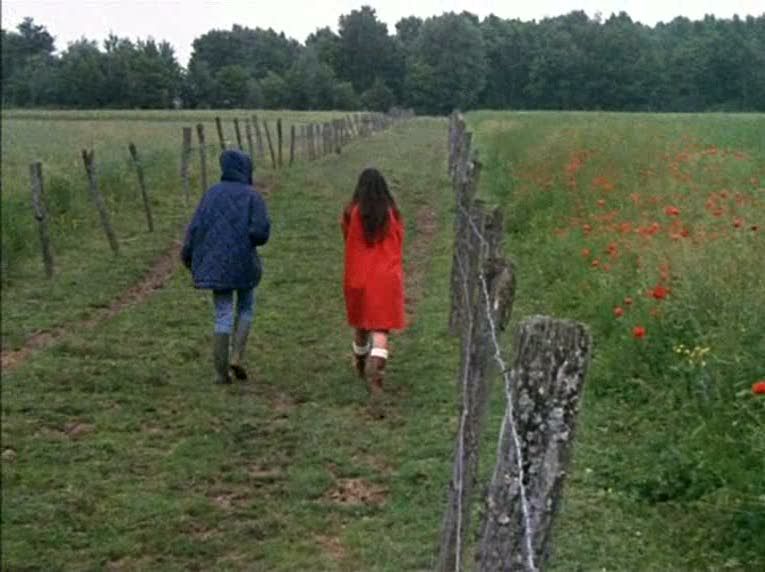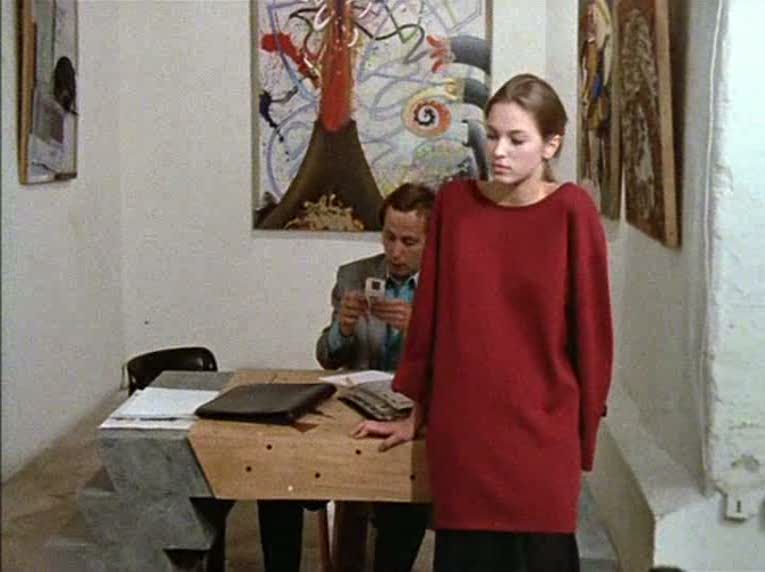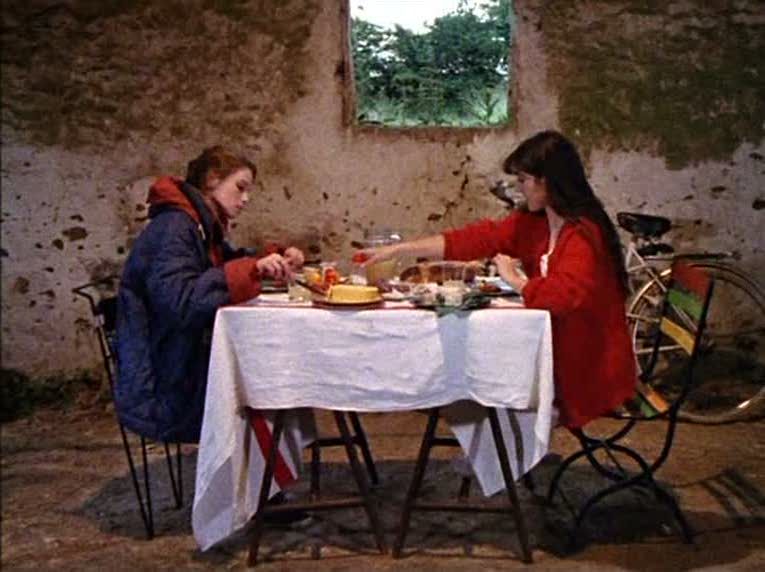
The title characters of Eric Rohmer's 4 Adventures of Reinette and Mirabelle can be seen as Rohmer's incarnation of his New Wave contemporary Rivette's Celine and Julie. Reinette (Joëlle Miguel) and Mirabelle (Jessica Forde) are, in fact, the Celine and Julie of the mundane. Their "adventures," divided into four segments as the title suggests, are not fantastical or magical, as in Rivette's film, but prosaic. If Rivette's film is all about wonder and fiction, about playing games and going to the cinema to experience (and manipulate) stories, Rohmer's film is about the more ordinary adventure of forming and keeping friendships. In the first of the film's four segments, Reinette, a painter living alone in the country for the summer, first meets Mirabelle, a student from the city whose bike has a flat. Reinette repairs the flat and the two girls slowly become friends as they spend the next several days at Reinette's rustic home. While there, Mirabelle learns about farming and country living, and the girls try to wake up just in time for the so-called "blue hour," the single moment every morning when there is total silence. This conceit, in which the natural world provides nearly spiritual catharsis, is reminiscent of the driving force behind The Green Ray, in which the heroine's romantic quest is symbolized by the desire to glimpse a fleeting phenomenon that sometimes occurs just at sunset.
Although Rohmer transcribes the basic set-up of Celine and Julie Go Boating from the mystical territory of Rivette's film, Rohmer does preserve the sense of charm and humor that characterized his obvious influence. His heroines are bright, pretty young girls whose adventures are always light-hearted and marked by a sense of fun and playfulness, and above all by an openness to the possibilities that present themselves. Each of these four segments revolves around a new set of ideas, a new set of opportunities for these girls to interact with one another and the world around them in ways that reveal and explore their conflicting moral perspectives and priorities. Rohmer is examining the ways in which, from a common bond of friendship and affection, these new friends probe their different outlooks on life and morality. It's a typical Rohmer subject, starting from the dawning of a friendship and then revealing, in one incident after another, just how different these girls actually are in how they think about the world and each other.

In the film's second segment, Reinette has taken Mirabelle up on the latter's offer to come to Paris as her roommate while Reinette enrolls in art classes. It's the film's most straightforwardly comic segment, as Reinette has to deal with a rude waiter (Philippe Laudenbach) whose patter and arbitrary restrictions are absurd and frustrating. Reinette tries to pay him, but she only has a large bill that he insists he can't break — and since she doesn't have anything smaller, he treats her as though she's unable to pay, trying to stiff him, and even suggests that she was the same girl who had run out on him without paying on a previous day. This is especially maddening to Reinette, because as it emerges throughout the film, one of the principal differences between her and Mirabelle is the two girls' respective attitudes towards regulation, justice and order. Reinette seems to believe, implicitly and unquestioningly, in the rightness of the law; she believes that bad acts will/should be punished and that goodness will be rewarded, and that the rules should always be followed. Mirabelle, on the other hand, is more of a free spirit, unconstrained by such restrictions and aware that the world is often unfair, that Reinette's clichéd certainties don't always pan out. Lacking her friend's faith in justice and rules, she doesn't feel that same obligation to law and order. So while this is a genuine dilemma for Reinette, once Mirabelle arrives, the answer seems simple to her: the waiter is a jerk, so the girls take off, with Mirabelle in the lead dragging her friend along.
This theme, the subtext in this comic tale about the waiter, comes to the fore in the third segment, in which the two girls encounter panhandlers, swindlers and a kleptomaniac. These incidents provide the friends with an opportunity to discuss doing good, punishing bad, and the proper way to deal with breaking the rules. The central incident of the story is Mirabelle's observation of a shoplifter (Yasmine Haury) at a local market. Rohmer takes an interesting approach to this incident, first showing it in a wordless sequence as Mirabelle follows the shoplifter and the two store security personnel (cameos by filmmaker Gérard Courant and Rohmer favorite Béatrice Romand) who are keeping an eye on her. It's wonderfully staged, with a keen sense of comic timing as the shoplifter is trailed by the store guards who are in turn trailed by the curious Mirabelle, all three groups walking across the frame in sequence through the market's aisles. Mirabelle then recounts the whole story to Reinette — including the part where she cleverly helped the shoplifter get out of the store without getting caught, although she was then unable to give the woman back her ill-gotten goods. The scene essentially plays out twice, once visually and once in words, so that Rohmer can show the reactions of Mirabelle (bemused) and Reinette (horrified) to this anecdote.
Basically, the shoplifter's tale provides an opportunity for Reinette to discourse on right and wrong; she can't comprehend why Mirabelle would intervene like that to help a woman get away with stealing. Later, her outrage finds another outlet when she misses her train and winds up hanging around the train station for an afternoon, observing the swindlers and panhandlers doing their work. Ironically, Reinette herself is placed in the same position, since she needs change to make a phone call, but she doesn't seem to realize that she's doing the same thing these beggars are doing, asking strangers for money. Then she accosts a swindler (played by Rohmer regular Marie Rivière) who's giving passers-by a story about having her purse stolen. Here, Reinette's abstract morals are confronted with a reality more complicated than she'd expected: the swindler breaks down and cries about her troubled life and her desperate need for money, shaming Reinette out of her comfortable moral superiority.

The final segment continues this emphasis on economics and the struggle for money, as Reinette tries to sell one of her paintings, hampered by her rash bet that she can maintain a vow of silence for an entire day. Class is one unspoken subtext running through the film, actually, even though of all the French New Wave greats Rohmer is often thought of as the filmmaker least concerned with such socio-political matters. But in this fourth section Reinette is struggling to make her rent, afraid that she'll have to go back to the country since she's unable to make a living in Paris. Instead, she goes to see a pompous art dealer (Perceval le Gallois star Fabrice Luchini) who spits out so much overly analytical nonsense about her painting that, at first, he doesn't even realize that she's not talking. Nevertheless, he's the one in the position of power, and only the intervention of Mirabelle, rebellious as ever, is able to destabilize things and switch the upper hand to the younger, less financially secure girls. (The film's final line, then, is a wryly ironic reminder that even this small victory has no real impact on the capitalist, who ultimately retains his power and his profit.)
This is an especially rich film, with a wealth of substance and depth in the way it explores a burgeoning relationship and all the moral, political and philosophical ideas that flow between these two intellectually curious and lively friends. Rohmer focuses on his titular heroines in a playful way, reflected in the primary colors that flow through the film, often in the girls' clothes — most often bright red and blue — and the striking static compositions. The film's visual aesthetic shifts from the warm natural palette of the opening scenes, with fields of tall grass swaying in the wind and thin veils of drizzling rain, to the more minimalist austerity of the city, where the girls, in their simply colored outfits, are often set off from the bare white walls of their apartment. Above all, the film is a quiet delight, possessing a more directly humorous sensibility than Rohmer usually displays. Several scenes here play out as skits, especially Mirabelle's final showdown with the art dealer, in which she overpowers him with the sheer profusion of her chatter. That's a distinctly Rohmerian ending, if nothing else: victory is achieved through an excess of talk, even if the film as a whole is equally defined by its quieter, more graceful moments.







0Awesome Comments!